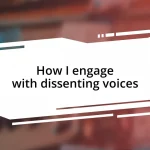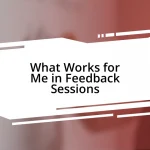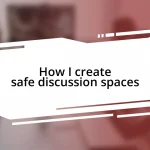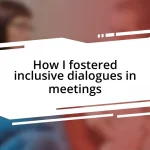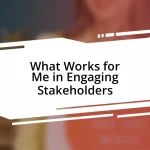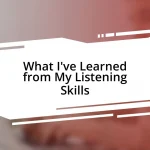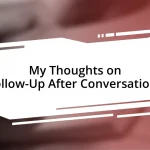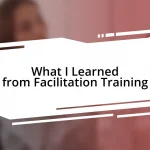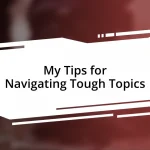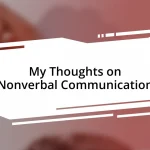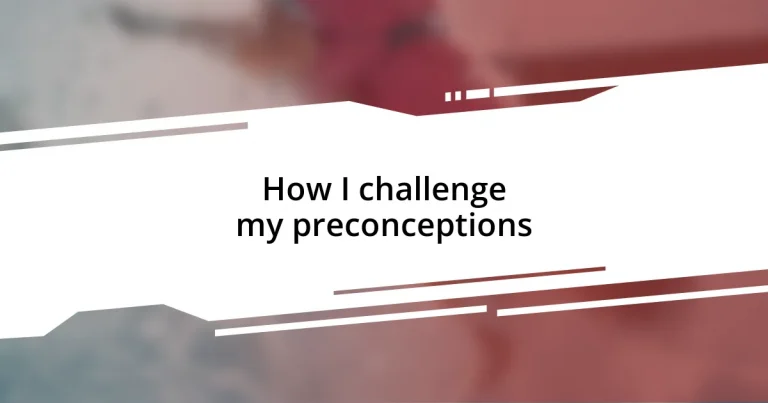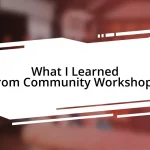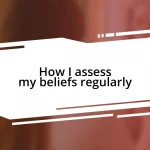Key takeaways:
- Preconceptions limit our understanding and creativity, urging the need to challenge ingrained beliefs through open-mindedness and vulnerability.
- Reflecting on personal experiences can reveal the fluidity of our beliefs, transforming challenges into opportunities for growth.
- Engaging in active listening fosters deep connections and allows us to appreciate diverse perspectives, leading to personal development.
- Implementing change in thought involves relinquishing the need to be right and embracing the insights of others to reshape our understanding.
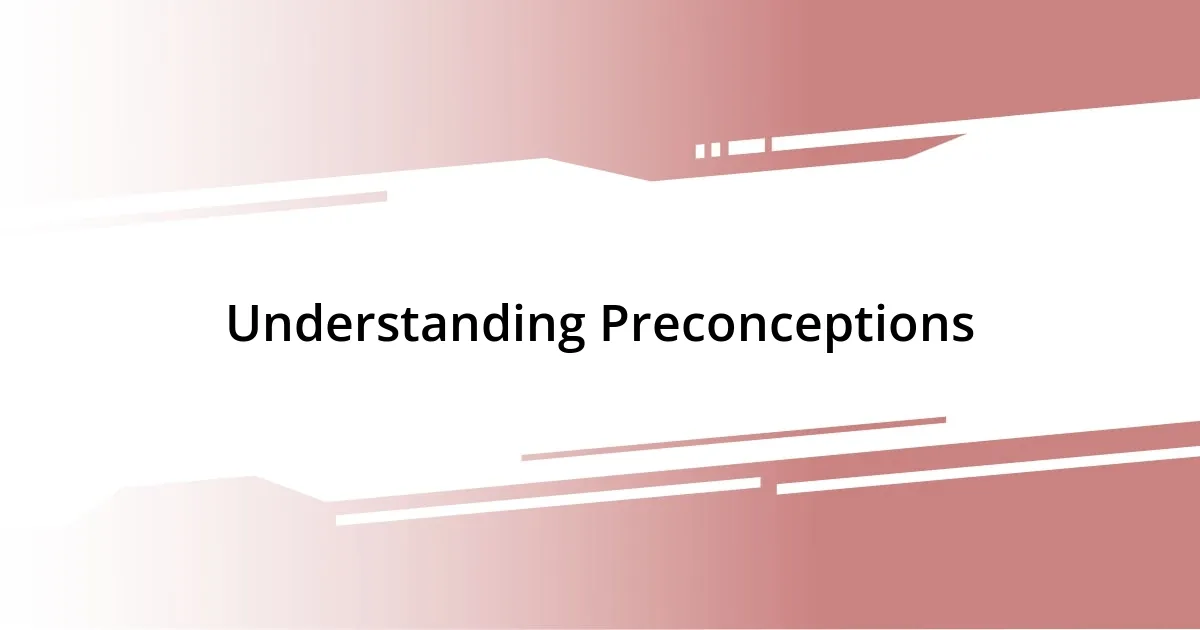
Understanding Preconceptions
Preconceptions shape our perceptions and can restrict our view of the world. I remember a time when I assumed that all artistic expressions required formal training, leading me to dismiss some local talent simply because they were self-taught. It was a wake-up call when I attended a gallery opening and saw breathtaking pieces that challenged my belief—how many opportunities do we overlook because of our own biases?
These ingrained beliefs often stem from our upbringing, societal norms, or even media influences. I found myself reflecting on this during a conversation with a friend who held strong opinions about what constitutes a ‘real’ job. This made me wonder, how often do we box others—or even ourselves—into categories that limit our potential and creativity?
Understanding preconceptions involves embracing vulnerability. Just recently, I pushed myself to attend a community event focused on cultural storytelling, an area I initially thought didn’t apply to me. By letting go of my assumptions, I not only learned about diverse experiences but also connected with others on a deeper level. Isn’t it fascinating how stepping outside our comfort zones can open new pathways for learning and growth?
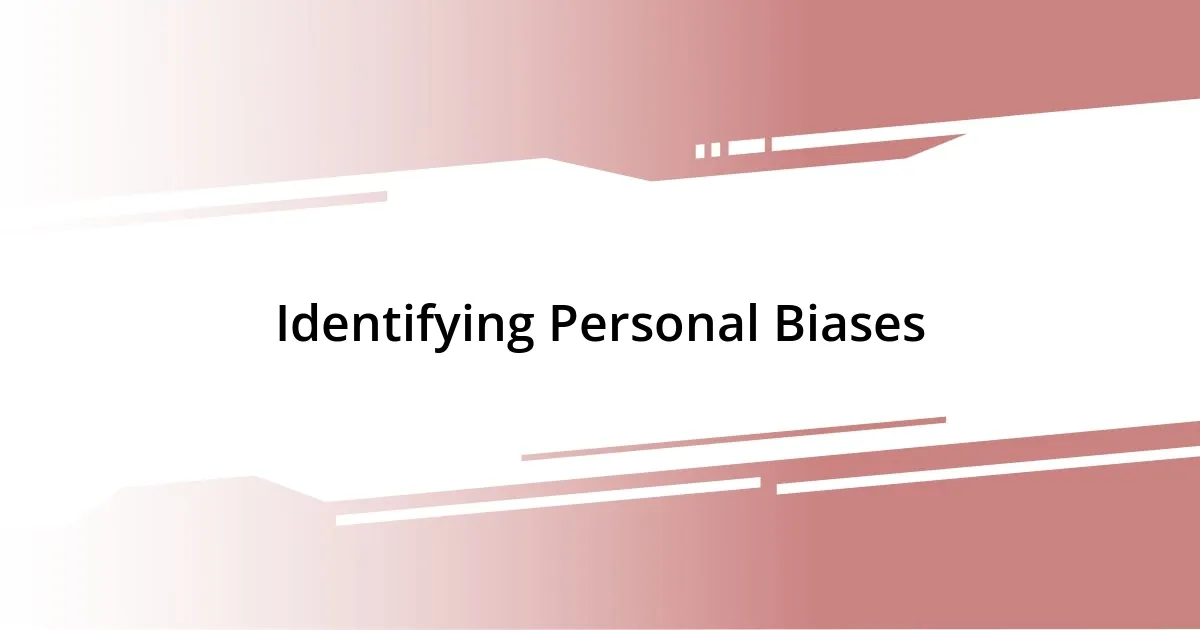
Identifying Personal Biases
Identifying our personal biases can be a daunting yet enlightening journey. I recall a time in a book club where the discussion turned to genres I never took seriously, like romance. Initially, I’d dismissed them as frivolous, but hearing my peers share their transformative experiences with such stories made me confront my narrow view. It was eye-opening to realize my bias was limiting not just my reading list, but also my understanding of different human experiences.
To effectively recognize and understand our biases, I’ve found it helpful to reflect on a few key areas:
- Upbringing: Consider how your family views different situations—what were the topics that were “off-limits” in discussions?
- Media Influence: Reflect on the shows or news sources you regularly consume—do they portray a balanced perspective?
- Self-Assessment: Think about your gut reactions to unfamiliar ideas—do you tend to dismiss them outright, or do you engage with curiosity?
By thinking critically about these areas, I’ve begun to unravel my preconceived notions and opened myself up to a wider perspective. Each small revelation adds depth to my understanding of the world around me.
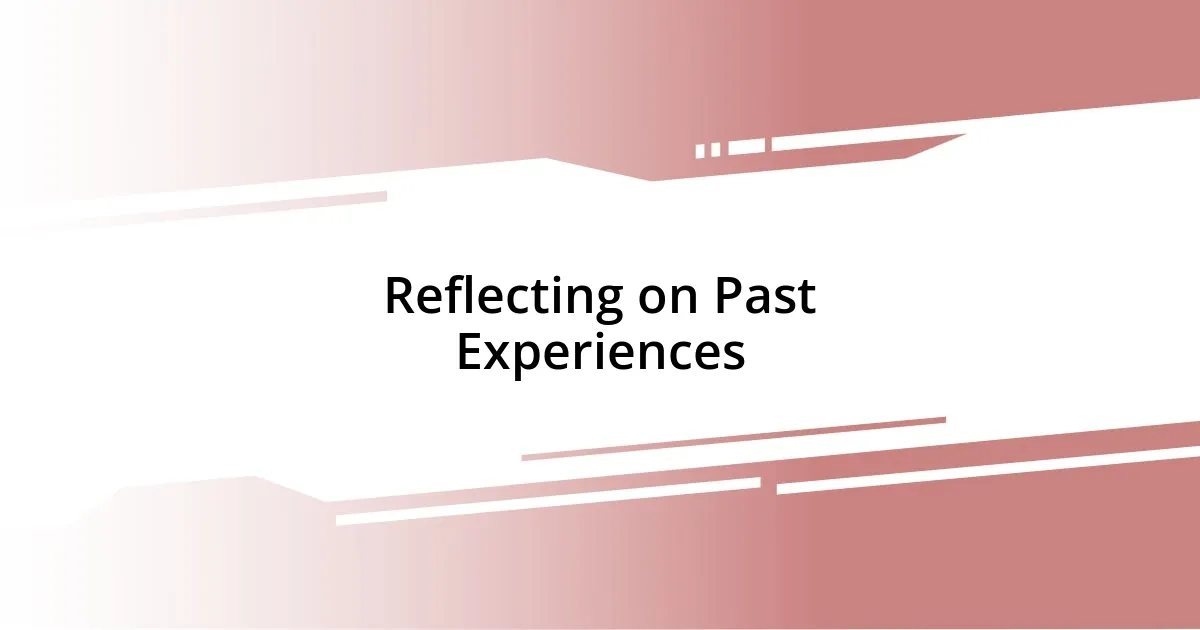
Reflecting on Past Experiences
Reflecting on past experiences offers us a powerful lens through which we can challenge and reshape our preconceptions. I had a moment of clarity while revisiting my childhood neighborhood. Walking through the streets where I played, I remembered a group of friends who had diverse backgrounds. I used to think their experiences were too different from my own to relate. Yet, as an adult, I now see the richness of those stories as a tapestry of shared humanity. It dawned on me that dismissing their narratives limited not just my understanding, but also my ability to connect with others meaningfully.
I’ve found that revisiting significant milestones in my life often brings new revelations. For instance, during high school, I struggled with math, which prompted me to label myself as “bad at it.” Years later, I encountered statistics in my career, which was initially intimidating. Reflecting on that past experience ignited a realization: my preconception wasn’t a fixed trait but rather a moment in time that I had the power to reinterpret. Now, instead of seeing challenges as stumbling blocks, I view them as opportunities for growth and learning.
Engaging with my past helps to highlight the fluidity of our beliefs. My first solo travel experience was initially daunting. I remember worrying about traveling alone in a foreign country. Yet, that trip became a defining moment in my life, as I immersed myself in new cultures and perspectives. Reflecting on that experience reminds me that stepping outside of my comfort zone can lead to profound personal growth. How often do we let fear of the unknown hold us back from transformative experiences? Each reflection serves as a reminder that challenging preconceptions is an ongoing journey.
| Experience | Initial Preconception |
|---|---|
| Childhood Friends | Different backgrounds mean no connection. |
| High School Math | Being “bad” at math is permanent. |
| Solo Travel | Traveling alone is intimidating and lonely. |
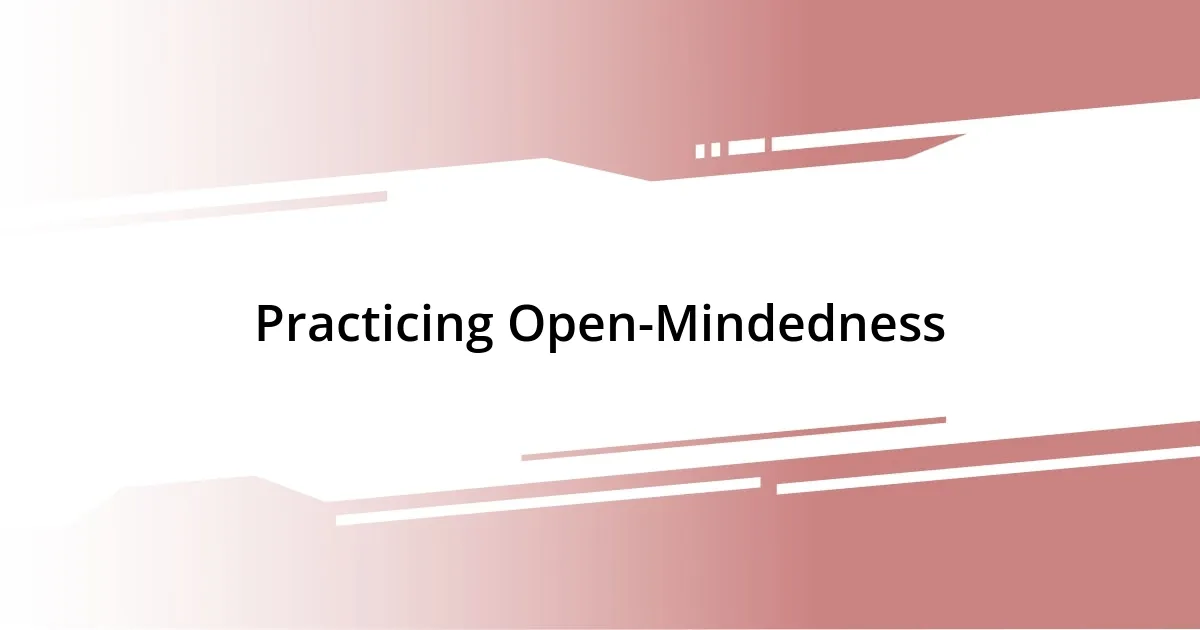
Practicing Open-Mindedness
Practicing open-mindedness is a skill I’ve learned to cultivate over time, and it often begins with a simple mindset shift. I remember vividly a dinner conversation with friends last summer, where one mentioned their unconventional career choice. Initially, I felt the urge to challenge their life path, but then I paused and asked myself—why not embrace their perspective? Sharing their journey opened a rich dialogue, sparking my curiosity about fields I’d never considered, reminding me that different paths can lead to unexpected inspiration.
One practice I find particularly effective in fostering open-mindedness is seeking out diverse perspectives intentionally. For example, I started following people on social media who hold views starkly different from my own. At first, it felt uncomfortable. But, slowly, I found myself engaging with their insights, which often challenged my initial reactions. Have you ever found yourself surprised by the wisdom in unexpected voices? I certainly did, as these interactions expanded my worldview, pushing me beyond my comfort zone.
Another strategy I’ve adopted is embracing the art of questioning—not just others but myself too. I often reflect on why I hold certain beliefs or opinions. In one instance, I encountered a project that aligned with a cause I had little interest in. Instead of dismissing it outright, I explored my resistance. What was I afraid of? When I finally allowed myself to dig deeper, I recognized that my hesitance was rooted in ignorance rather than rational judgment. This self-inquiry enriched my understanding and helped me to become more open to new ideas. Isn’t it fascinating how questioning can reveal hidden assumptions?
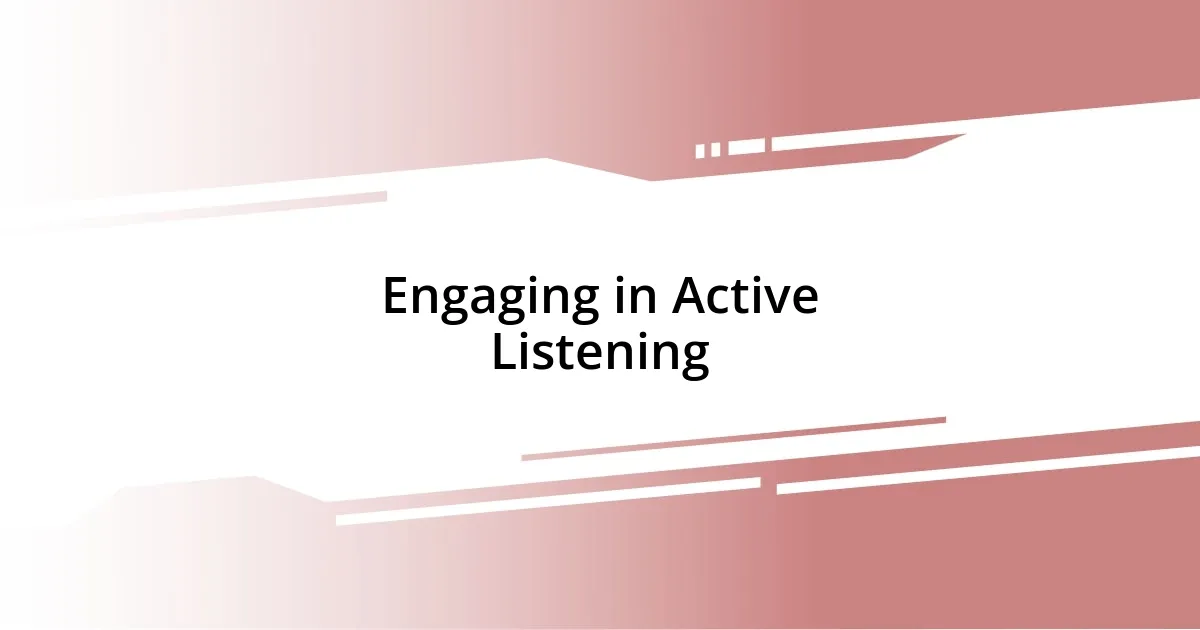
Engaging in Active Listening
Engaging in active listening has truly transformed how I approach conversations. One memorable instance was during a heated discussion with a coworker about a project. Instead of interrupting or formulating my response while they spoke, I consciously focused on their words, tone, and body language. Suddenly, I realized that some of their frustrations mirrored my own. This connection made it easier to bridge our differences and work toward a common goal, reminding me that listening fully opens up pathways to understanding.
I often notice that engaging in active listening goes beyond just hearing words; it involves feeling the emotions behind them. For instance, I once had a friend who shared a personal struggle, and as she spoke, I let my guard down and really showed my empathy. Nodding and offering small affirmations, I created an environment where she felt safe to open up further. It felt powerful to reflect back her feelings, and I was struck by how such attention could fortify our bond. When have you felt truly heard? It’s in those moments that deep connections flourish.
Practicing active listening reminds me that everyone carries a complex tapestry of experiences and emotions. I recall attending a community meeting where different voices shared their frustrations and hopes. Listening intently to each story—not just the facts but the feelings behind them—made me acutely aware of the broad spectrum of perspectives in the room. I left that evening not only with insights about the issues at hand but also with a deep sense of responsibility to foster inclusivity and understanding. How can we expect to challenge our preconceptions if we don’t take the time to really listen?
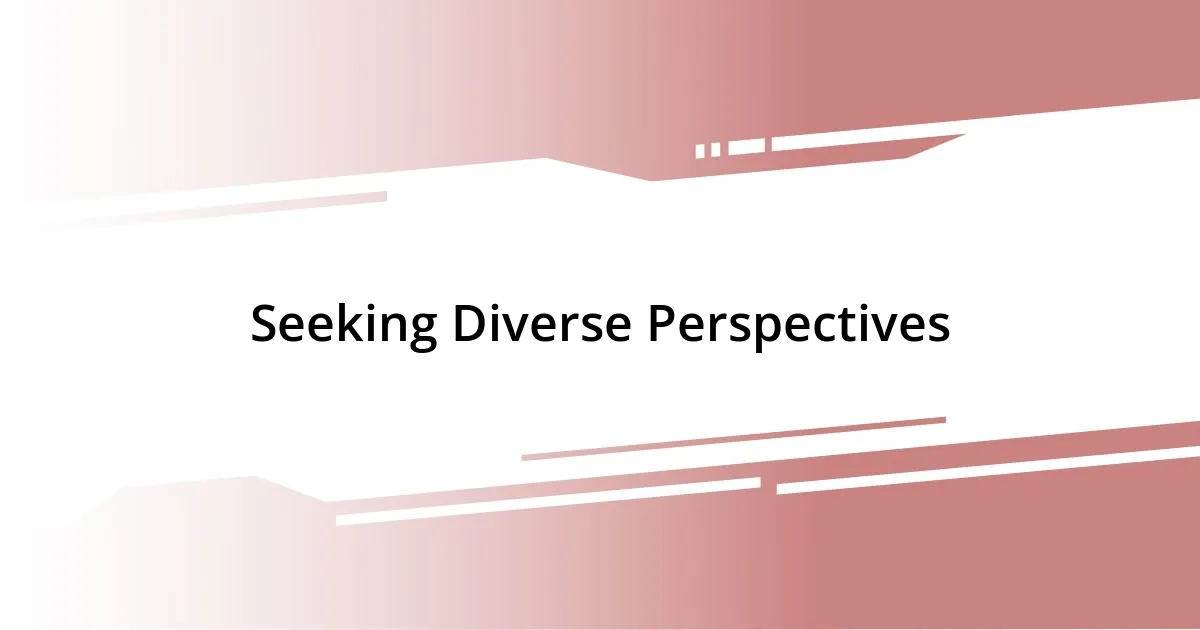
Seeking Diverse Perspectives
Seeking diverse perspectives isn’t just about expanding my circle; it’s a journey towards personal growth. One day, while volunteering at a local community center, I met a woman from a vastly different background than mine. As we talked about her cultural traditions, I was captivated by her experiences, which challenged my own narrow views. How often do we miss out on incredible stories that could reshape our thoughts simply because they come from someone unlike us?
I actively seek out experiences that break the mold of my usual encounters. Recently, I attended a film festival featuring documentaries from international filmmakers. Each story pulled me into diverse realities full of struggles and triumphs I had never faced. It was eye-opening to see how a lens can vastly alter the narrative. Had I stuck with the films that matched my interests, I would have missed a wealth of knowledge. Isn’t it incredible how the stories of others can paint a broader picture of our world?
What strikes me most is how seeking diverse perspectives forces me to confront my own biases. There was a time when I held strong opinions about a specific social issue. Engaging with advocates from opposing viewpoints led me to not only understand their rationale but also question my initial stance. This process wasn’t always comfortable—sometimes it felt challenging to let go of preconceived beliefs. Yet, isn’t it in that discomfort that real growth happens? Each encounter has left me more equipped to tackle nuances in discussions, proving that diversity in thought is not just enlightening, but essential.
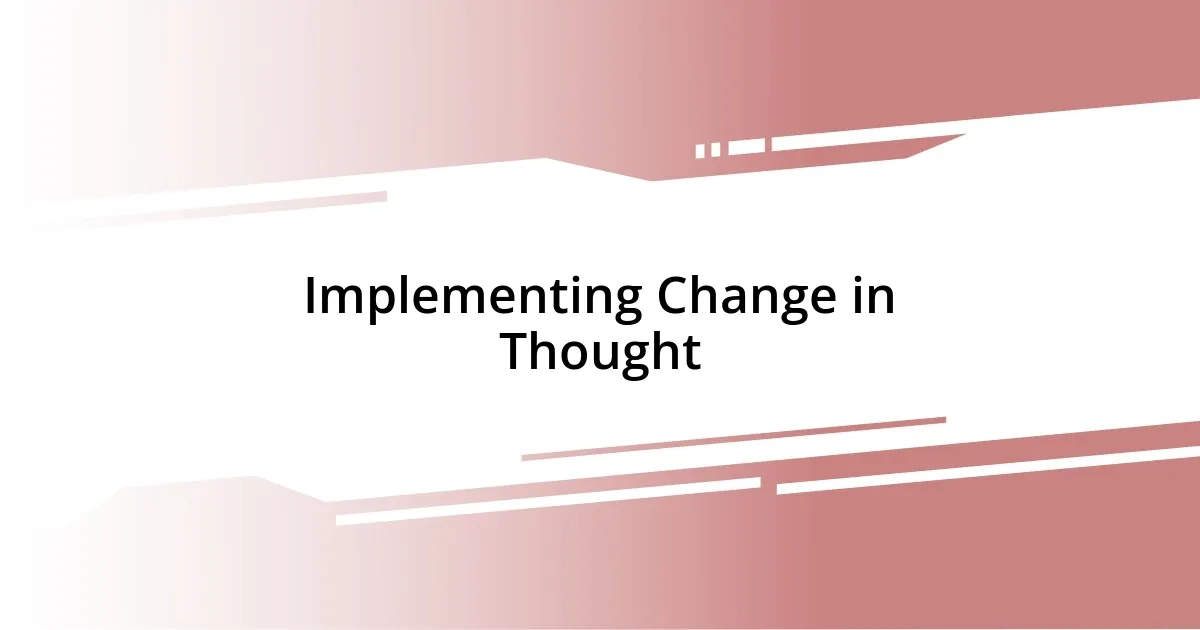
Implementing Change in Thought
Implementing change in thought requires a deliberate shift in how I perceive the world around me. I recall a pivotal moment during a brainstorming session where I was tasked with leading a team. At first, I clung to my own ideas, but after a few minutes, I noticed the room grew silent. It dawned on me that I needed to invite others to share their input. Once I opened the floor, fresh, innovative ideas emerged, drastically altering our direction. Have you ever held a discussion where your perspective completely shifted? It’s as if the room suddenly expands when we embrace others’ thoughts.
Another experience that stands out was my participation in an online discussion forum. I started with certain assumptions about a controversial topic, convinced I had all the facts. However, as I interacted with others, I felt the unwavering grip of my preconceptions loosening. What surprised me most was realizing that my tightly held beliefs weren’t as universally accepted as I assumed. Instead of resisting, I chose to engage and ask questions. I found myself enriched by what others brought to the conversation. Isn’t it fascinating how engaging with different viewpoints can lead us to rethink what we believed to be true?
I’ve learned that implementing change in thought is often about relinquishing the need to be right. One evening, while catching up with a friend over coffee, we explored a sensitive topic that deeply affected us both. Initially, I was defensive, eager to maintain my stance; however, as she shared her vulnerable experiences, I felt a shift within myself. The more I absorbed her story, the more my rigid perceptions melted away. It reminded me that when we approach conversations with an open heart, we not only evolve our thoughts but also create space for profound connections. How can we hope to grow if we don’t allow ourselves to be changed by others?
